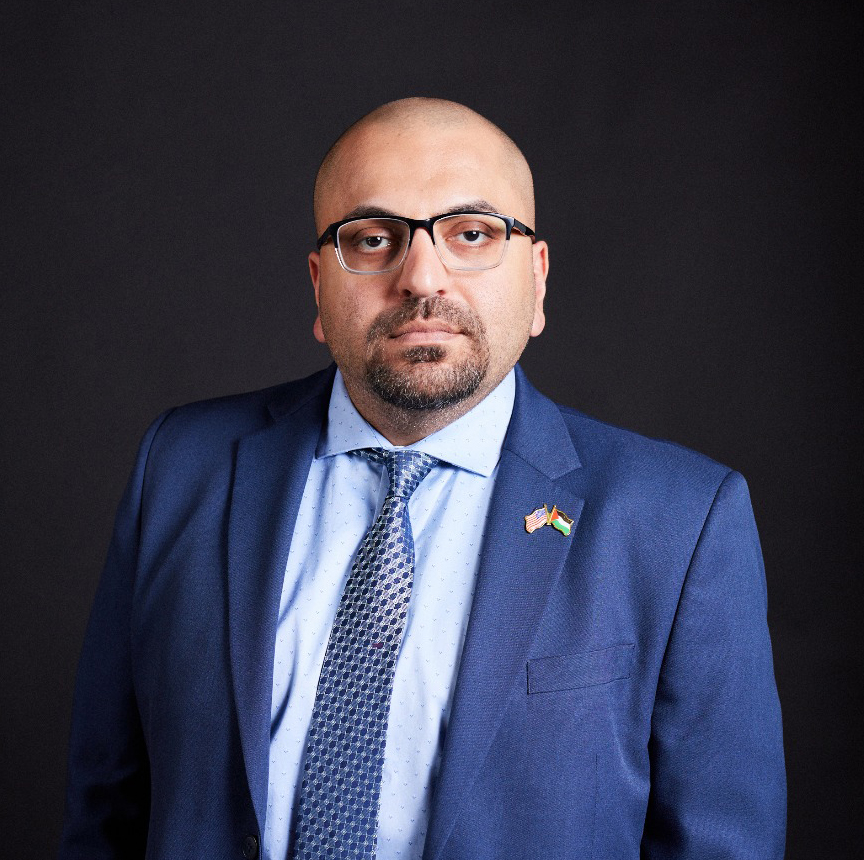
Ahmed Fouad Alkhatib


Ahmed Fouad Alkhatib is the founder and director of the Realign for Palestine project at the Atlantic Council, where he is a resident senior fellow with the Scowcroft Middle East Security Initiative at the Middle East Programs. Alkhatib is a Palestinian-American writer, speaker, and advocate who grew up in Gaza City, which he left in 2005 as a teenage exchange student to the United States. Upon attempting to return to Gaza in the summer of 2006, he was unable to enter the Strip after Hamas abducted an Israeli soldier, which set off a serious conflagration that resulted in a prolonged border closure with Egypt. Thanks to the support of human rights and peace activists, he was able to return to the US, where he finished high school while applying for and ultimately receiving political asylum status due to Hamas’s political rise and violent control over the Gaza Strip in 2007.
Alkhatib became an American citizen in 2014, vowing to leverage his newly acquired privileges to make the world a better place for his people and fellow citizens.
Alkhatib became an American citizen in 2014, vowing to leverage his newly acquired privileges to make the world a better place for his people and fellow citizens. In 2011, Alkhatib earned a bachelor’s degree in business administration and began working for a homelessness policy advocacy organization, focusing on outreach to current and prospective allies, fundraising, and engagement. In 2015, he founded Project Unified Assistance, a US-based effort to establish an internationally-run, Israeli-approved airport in the Gaza Strip based on historical and contemporary precedents.

From 2016 and until early 2024, Alkhatib worked in international development with a focus on the global south as part of a philanthropic organization that supported global health and poverty alleviation interventions, particularly in Africa. Interested in geopolitics and security, he pursued a master’s in intelligence and national security, which he obtained in 2023. Since leaving Gaza, Alkhatib has remained closely connected to the Strip’s affairs through his immediate and extended family members, most of whom remained in the coastal enclave. When the October 7 attack, he began challenging the dominant narratives that quickly emerged following the massacre and the unprecedented war that the Gaza Strip and its people experienced. Furious at Hamas’s terrorism, crimes against Palestinians, and the support he received outside of Gaza for carrying out October 7, he has emerged as a fierce and consistent critic of the Islamist group while speaking out uncompromisingly against Israeli crimes in Gaza, military occupation and the settlement enterprise in the West Bank, and the dehumanization of Palestinians. This has earned him praise and recognition from people on both sides of the Israel and Palestine conflict, many of whom are hungry for a third way. This ‘third narrative’ operates outside the entrenched position of “pro-Palestine” and “pro-Israel” communities. However, this has also meant that he receives anger, attacks, and aggression from both sides of the aisle who only want to hear messages that conform to their existing views. Despite immense personal loss, including dozens of his family members who were killed in Israeli airstrikes during the war on Gaza, Alkhatib has consistently advocated for healing and reconciliation in pursuit of durable and courageous peace between Israelis and Palestinians. He made a point of connecting with survivors of October 7 and hostage families to build bridges, promote common humanity, and create common ground that’s humanely and pragmatically steeped in empathy, kindness, patience, and understanding where people are coming from. Alkhatib writes extensively on Gaza’s political and geostrategic affairs and has grown a substantial online following. He speaks about the Strip’s humanitarian, security, and local affairs. He has played a role in advocating for some large-scale initiatives, such as the food airdrops campaign and raising hundreds ofthousands for the International Medical Corps(IMC)’s life-saving work on the ground. Alkhatib’s writing and commentary have been regularly featured in US, Israeli, and international media outlets. He is a firm believer in intellectual independence, diversity, curiosity, and breaking the enforced conformity that stifles meaningful discussion and dissent within the Palestinian community.

The time to Realign For Palestine is now
